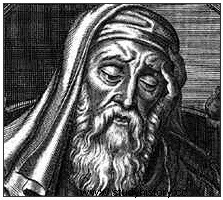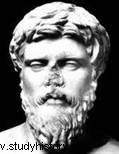 Philosopher, physician, moralist and biographer of Greek origin, Plutarch was born around AD 46. J-C in Boeotia. A great respected man of his time, he made the link between Greece and Rome - of which he became a citizen - and distinguished himself, among other things, with his Parallel Lives , biographies and character studies of famous men. Systematically comparing the life of a great Greek man to that of a great Roman figure, he seeks to demonstrate the continuity between the two brilliant civilizations. His moral works inspired many of Shakespeare's historical plays. Plutarch died in Thebes in AD 120. J-C, and will become an important source for ancient history.
Philosopher, physician, moralist and biographer of Greek origin, Plutarch was born around AD 46. J-C in Boeotia. A great respected man of his time, he made the link between Greece and Rome - of which he became a citizen - and distinguished himself, among other things, with his Parallel Lives , biographies and character studies of famous men. Systematically comparing the life of a great Greek man to that of a great Roman figure, he seeks to demonstrate the continuity between the two brilliant civilizations. His moral works inspired many of Shakespeare's historical plays. Plutarch died in Thebes in AD 120. J-C, and will become an important source for ancient history.
Plutarch, Platonic student
Born around 46 in the village of Chaeronea in Boeotia, probably from a good family, the young Plutarch went to Athens around 65, where he studied science and philosophy of the Platonist Ammonios. The latter, a highly respected scholar at the time, became a reference for Plutarch, who quoted him regularly in his work. At this time, Nero himself is in Greece, and Plutarch is said to have accompanied his master and the emperor to Delphi.
The future philosopher then leaves for Alexandria to complete his training in medicine. He returns to Chéronée, ready to fulfill illustrious missions.
Plutarch, citizen of Athens and Rome
His training completed, Plutarch was entrusted with important missions by his fellow citizens. He must first go to Achaia, to the proconsul, then, in 78, he is in Rome mandated by Chaeronea and other Greek cities. We are then at the end of the reign of Vespasian. It was during this trip that he met his friend L. Mestrius Florus (Roman historian), with whom he visited the tomb of Otho (of which he would write a Life ) in Brixellum. In Rome, where he stayed several times, he learned Latin and gave lectures and lessons that brought him success and esteem.
Back in Greece after travels that took him from Rome to Asia, his reputation made, he became a citizen of Athens, in the Leontis tribe. Plutarch then obtained the same honor from Delphi, where he was a priest of Apollo around 100, then epimelete of the Amphictions, under the reign of Trajan. He also creates a private academy where he essentially teaches ethics, in the form of lessons and discussions. His wife Timoxene bore him five children; the eldest of the four boys died as a teenager, the youngest in infancy and the only girl at the age of two. These bereavements inspire a Consolation to his wife.
Emperor Trajan plays an important role in Plutarch's career, since he gives him the consular ornaments. In the meantime, he became a Roman citizen thanks to his friend Florus - from whom he took the gentile Mestrius - and to a relative of Trajan, Q. Sosius Senecio (consul in 99, 102 and 107), before entering the equestrian order. Plutarch ended his career as procurator in Achaia for the Emperor Hadrian, for whom he would have provided part of the instruction. Respected by all, he died around 120, in Thebes, at an advanced age for the time.
Parallel Lives
Scholar with multiple skills, Plutarch is first and foremost a moral philosopher. For the historian, it is especially useful for his biographies gathered in the Parallel Lives , written from about 100. He insists these are biographies, not Stories , marking the difference by the nature of the facts related. Plutarch thus seeks what seems significant to him, a negative or positive exemplarity, to draw the portrait of his illustrious men. These Lives are intended to be read orally. They are about fifty, including forty-six "parallels", among which:Alexander / Caesar, Demosthenes / Cicero or Lysander / Sylla.
Plutarch also stands out for his method. He uses literary sources, of which he makes a meticulous critical study. On the other hand, he seems to have had some difficulties in Latin, which leads him to make some errors, on Livy for example. The Parallel Lives are of historical interest but are mostly portraits or character studies. Plutarch pursues a moral aim; in the Life of Timoléon, he compares the life of great men to a large mirror “which I look at in order to try in some measure to regulate my life and to conform it to the image of their virtues”. He recalls the greatness of the two Greek and Roman peoples and calls for mutual esteem, even if Greece remains preeminent for him. He is thus one of the first to consecrate the existence of a Greco-Roman civilization.
Moral Works
In addition to the famous Parallel lives of illustrious men , which constitute fifty historical biographies, Plutarch is the author of a rather disparate set of nearly eighty writings improperly called Moral Works or Moralia .
In his Moral Works, of very diverse forms and content, Plutarch deals with subjects of morality proper (On Virtue and Vice, On the Love of riches, Of tranquility of soul, Of flatterer and friend ), pedagogy (Music, How to listen ), theology or religion (On superstition, On Isis and Osiris, On the Delays of divine justice ), history (Features of women, Roman questions, Greek questions ), historical or literary criticism (On the Malice of Herodotus, Comparison of Aristophanes and Menander ), physics (Natural questions ), zoology (On the intelligence of animals ), and also deals with many other areas.
The nine books of his About tables , or more literally “of the banquet”, relating both to the rules of the banquet, to questions of philosophy, philology or physics, testify well to the breadth of Plutarch’s interests and curiosity. Follower of the Platonic doctrine (On the creation of the soul in Plato's Timaeus, Platonic Questions, Demon of Socrates ), he believes in the immortality of the soul, in divination, in the justice of providence. But his Platonism is tempered, “gentle and accommodating to civil life” (Montaigne). In his polemical treatises, he also shows a real knowledge of the doctrines of his Stoic and Epicurean adversaries.
The late posterity of Plutarch
 During his lifetime, Plutarch seems to enjoy only a fame limited to his province. In the following centuries, if he was appreciated by the Byzantines or the first fathers of the Church, he was almost devoid of fame in the West, like many other Greek authors, and was not rediscovered until the Renaissance. Machiavelli admires him, as does Erasmus who translates several of his treatises. William Shakespeare draws inspiration from his Parallel Lives to compose certain tragedies, such as Coriolanus, Julius Caesar or Antony and Cleopatra.
During his lifetime, Plutarch seems to enjoy only a fame limited to his province. In the following centuries, if he was appreciated by the Byzantines or the first fathers of the Church, he was almost devoid of fame in the West, like many other Greek authors, and was not rediscovered until the Renaissance. Machiavelli admires him, as does Erasmus who translates several of his treatises. William Shakespeare draws inspiration from his Parallel Lives to compose certain tragedies, such as Coriolanus, Julius Caesar or Antony and Cleopatra.
Plutarch's posterity is immense. Its translation by Jacques Amyot (1513-1593), on the orders of François I in 1542, was finally published in 1559. Plutarch influenced and was then praised by Bacon, Rabelais, Montaigne or Rousseau. His work influenced certain revolutionaries, such as Jules Michelet who was one of his last great admirers. It is today an important source for ancient history.
Bibliography
- Plutarch, Parallel Lives, trans. F. Hartog, Gallimard, 2002.
- J. Boulogne, Plutarch in Epicurus' Mirror, Presses Universitaires du Septentrion, coll. "Philosophy", 2003.
- J. Sirinelli, Plutarch of Chaeronea, Fayard, 2000.
